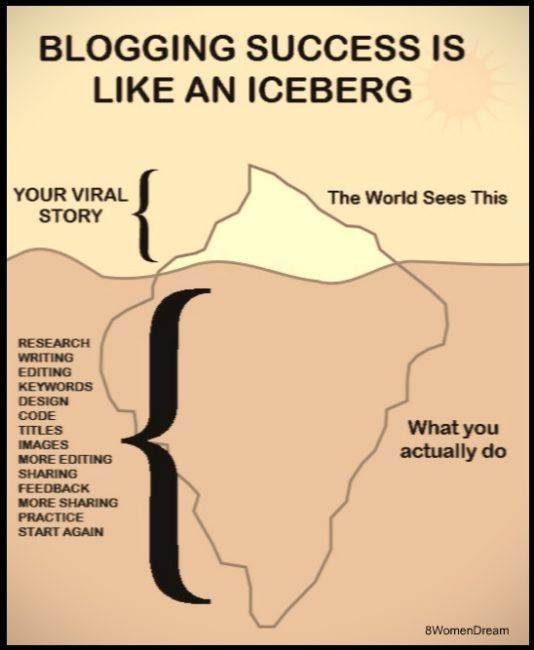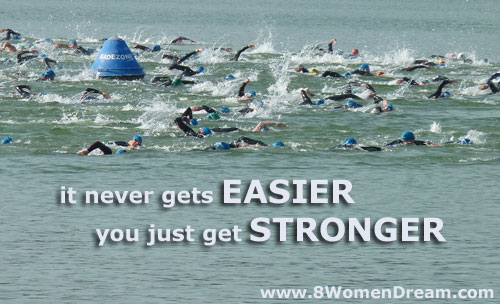Blogging is hard work. Get over it.
Blogging is more than simply sitting your butt down in a chair and pumping out brave words on some sort of word processing program, or for you die-hards, a legal pad with pen in hand.
If you are a writer, to call yourself a writer, you need to have your butt writing something every single day, and by the way, I think email counts towards that 1000 word a day professional quest — and even texting.
And.
If you are a blogger, to call yourself a blogger, you need to post something regularly, preferably once a week,
AND.
You need to understand how to manage a website (yes YOU DO) you need to learn marketing and social media. You also need to take a public speaking class, or a drama class to get your personality flowing and being out there in the world.
Every writer should be a blogger – then many of you will fully appreciate what is being laid out before you here to read and contemplate – free.
So today I want to share with you what goes into blogging and creating “artent” (which some call content) on the Internet.
1. First you have an idea of what you would like to share with the world.
Then you should ask yourself why. Then ask yourself why, again. And again. This process could take you a couple of days, or a week, so you have time to think about what you are about to add to the global conversation. Too many bloggers write without the reader in mind. If you are going to do that just keep it in a private diary. If you are going to publish online — understand why — why is this good for the reader?
And for those of you who don’t blog, but enjoy a blogger’s content, then take a moment and tell them so the free content keeps coming to you.
2. You have to actually sit down and write it.
Yeah. This part sucks sometimes — especially if your life picks up, you land a new job, you fall in love, you have a baby — you still have to sit down and write. Or don’t call yourself a writer.
And if you are not publishing anything online either then don’t call yourself a blogger.
And for those of you reading free content online understand that someone is preparing this for you in spite of a new job, falling in love, a new baby, the death of a loved one, the loss of a job, and life-in-general messing with the blogger’s creative mind.
3. Once it is written, it must be edited.
If you won’t edit, you aren’t a writer. Start by reading your story aloud as if your life depended on it. Stop and change anything that doesn’t sound right. Then read it backwards one sentence at a time.
When you are done, turn it over to an editor or some sort of editing software like Hemingway and edit some more. Then let it sit for at least a day and read it again.
Then remove the first paragraph.
For those of you who love to read blogs, send a note to your favorite blogger when you see s typo or mistake so they can correct it. Don’t put them down – don’t judge – just be kind and help a budding writer out.
4. Decide on the best keyword phrase that describes your story.
Once you’ve released your story out into the Internet, it dies a timely death in about 24 hours. That’s it. Unless you know someone famous with a lot of followers who suddenly decide to share your pearls of wisdom with their following, then your writing gets filed into search engines along with 3.06 billion other web pages.
The only way your creation has a chance of going viral, or being found again is if you can come up with the right phrase that people will use to find your type of story. And it had better show up on page one of search, or forget about it.
Try using the keyword phrase you believe best describes your story and place it in search to see what gets returned. If there is a disconnect between the intent of your story and what comes up in search, then you are using the wrong keyword phrase.
Look for a term that best describes your story and returns similar stories when used in search, then use this term in your title and throughout your story. Google keyword phrase tool might be hidden behind a firewall now, but you can still use Google Trends (see google.com/trends) which will tell you what people have used to search your term or something similar.
5. Tailor the story for reading on the Internet.
Readers scan pages on the Internet, picking out phrases and words to see if you are offering what they are looking for. Make it easy for them by using bold subheadings, paragraphs under three sentences, and visual clues to draw the reader into your story.
Readers love numbers and bullets — use them.
Use anything that allows a visitor to quickly scan your page and understand what your story before reading it. Ask a family member or friend to quickly scan your story in under 4 seconds and tell you what it is about.
If they don’t get it right, then you have more work to do to make your story scanable.
6. Look at the html to make sure 99.9% of the Internet can read what you’ve written.
I’m sorry. I hate to be the one to tell you this, but to call yourself a blogger, you must understand how the Internet works.
Dan Gookin has this great little guide called, Blogger’s Guide to HTML in a pdf that you can review by clicking here, which covers just about everything you need to know about html so that you understand what is happening in the background of your story when it is written on the Internet, and how to fix it, if it doesn’t look right on your brother’s computer.
7. Add visual interest with illustrations and images.
Use images that describe your story without having to read it. Your images will go a long way in selling your story and drawing readers in to actually sit and read what you have offered.
It´s been established that images are one of the most engaging aspects of top blog posts. Visitors prefer to share photos more than any other type of post on the Internet. Just make sure that you own the rights to use them.
Naming them with part of your keyword phrase before you upload them on the Internet helps them get found in image search and is another great way to help the world discover your story. Think of them as your own little Internet advertisement for your blog.
8. Craft a great story title that draws people in.
First, use your keyword phrase in your title.
ALWAYS.
Never deviate from the above.
Think of the Internet as a busy highway and your title is your sign signalling millions of people to get off the highway at the next off-ramp and spend some time with you. How would you stand out?
Emotion is the best way to attract interest. One of the best blog posts about crafting a great story title comes from Dan Shure at Moz called, Are Your Titles Irresistibly Click Worthy & Viral?!
Read it. Memorize it. Do it.
Your title is more important than your story so spend as much time crafting your title as you did writing your story.
9. Market your story.
Share it on Facebook. Ask your mom to share it on Facebook. Ask your kid to share it. Use social media and market your work. You should personally share your story more than once for the different time zones throughout the world.
Studies have shown that with each subsequent tweet of an existing blog post, bloggers experience as much as 75 percent more re-tweets from the public as the time before.
Unless you have a pr agent you are going to have to sell your own work. Don’t expect the world to naturally fall in love with you and shout your story form the rooftops. You have to be the one to tell the world about you.
10. Start all over again.
The minute you are done with your story, start on the next one. Take photographs wherever you go. Ask people about themselves. Tell your stories to test people’s reactions. Write the ones that garner the best responses.
This is the reality to writing on the Internet. It’s more than what you can imagine. It’s like writing a term paper every time you do it and you should handle it as if you currently have an F in the class and this story is going to be the very thing that saves your butt.
You’ve got to give it everything you’ve got and then apply the rules of the Internet because blogging is hard work.
And you know what?
Some great writer out there is doing all of this and more and it’s their story your readers will be reading instead of yours if you don’t go everything that’s required for publishing in this new medium.
Wouldn’t that be a waster of your dream if no one read your story?
I think so.
Catherine

Catherine Hughes is an accomplished magazine columnist, content creator, and published writer with a background as an award-winning mom blogger. She partners with companies to create captivating web content and social media stories and writes compelling human interest pieces for both small and large print publications. Her writing, which celebrates the resilience and achievements of Northern California’s residents, is featured in several magazines. Beyond her professional life, Catherine is passionate about motherhood, her son, close friendships, rugby, and her love for animals.
Note: Articles by Catherine may contain affiliate links and may be compensated if you make a purchase after clicking on an affiliate link.






